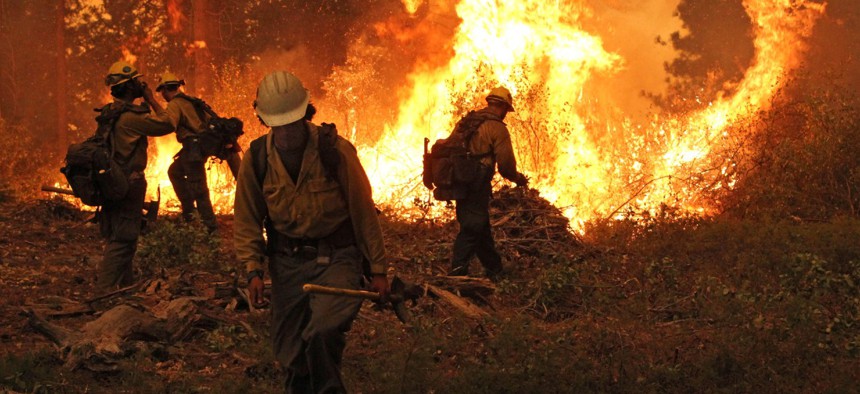
The Silver State Interagency Hotshot Crew works on a burning operation at the Rim Fire in the Stanislaus National Forest, which began on Aug. 17, 2013. Mike McMillan / U.S. Forest Service file photo
Bipartisan Bill Would Allow Federal Firefighters to Trade Shifts
Agencies often bar trades because in many cases the switch would result in one firefighter seeing his or her biweekly pay reduced, and the other becoming eligible for overtime.
A bipartisan group of senators last week reintroduced legislation that would ensure federal firefighters can trade shifts without impacting their pay or annual leave usage.
Firefighters typically work nontraditional schedules compared to other government employees, working 24-hour shifts and 72-hour work weeks, followed by longer periods of time off. Currently, firefighters employed by state and local governments can exchange shifts at will, but federal pay rules complicate matters for federal firefighters.
Two federal firefighters theoretically may trade shifts within a given biweekly pay period similarly to their state and local counterparts. But if the shifts are in two different pay periods, the firefighters would see their paychecks decrease for the shift they gave away, and become eligible for overtime for the shift they added to their schedule. As a result, many agencies forbid shift trading altogether, forcing the federal firefighters to take annual leave if a personal obligation conflicts with their work schedule.
Sens. Chris Van Hollen, D-Md., Tom Carper, D-Del., Susan Collins, R-Maine, and Jon Tester, D-Mont., reintroduced the Federal Firefighter Flexibility and Fairness Act (S. 838), which would ensure that federal firefighters who trade shifts across multiple pay periods would not see their regular pay decrease or trigger overtime pay requirements. The bill would not impact firefighters’ ability to make overtime on shifts that are not part of a “trade-of-time arrangement.”
“Our federal firefighters work tirelessly to help keep our communities safe—often working long and non-traditional hours,” Van Hollen said in a statement. “When something comes up, they deserve the ability to trade shifts without losing out on pay or annual leave.”
“In recent years, wildfires in the West have become more and more extreme—forcing our federal firefighters to work even longer hours as they put their lives on the line to keep our communities safe,” Tester said. “This critical bill gives them more flexibility to balance their time at work and their time at home, all while saving taxpayer dollars. Shift-switching is already commonplace for state and local firefighters, and it just makes sense to extend that practice to the federal level as well.”
International Association of Fire Fighters General President Harold Schaitberger endorsed the legislation, urging Congress to standardize the practice of shift trading for all firefighters in the United States.
“This important legislation gives federal firefighters the ability to better manage their challenging schedules to create better work-life balances,” he said. “It creates an opportunity that many non-federal fire departments already utilize successfully—with no appreciable cost to the employer.”







